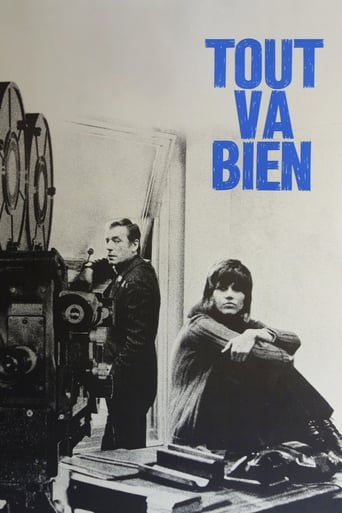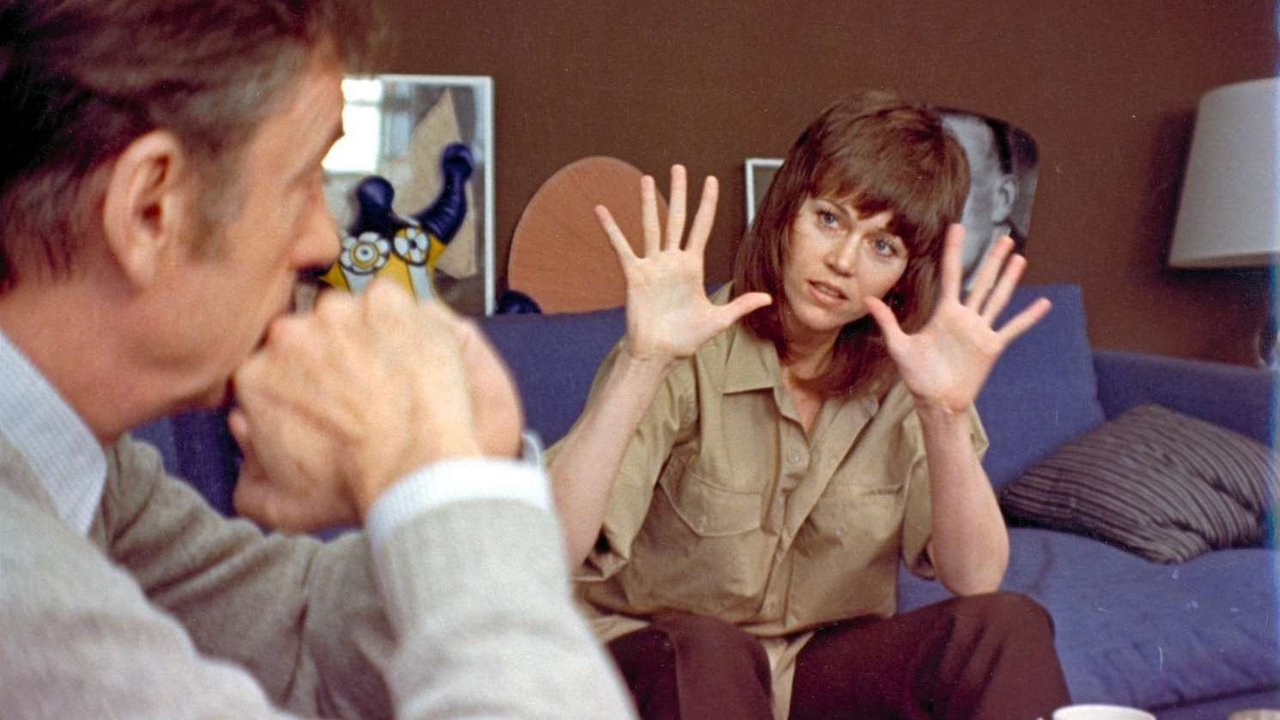moonspinner55
Political upheavals at a sausage factory in France ensnare a visiting female reporter and her commercial-director husband; after they return to the normalcy of their lives, the couple find their marriage has irrevocably changed. Examination of the European class struggle of the early 1970s from filmmakers Jean-Luc Godard and Jean-Pierre Gorin is cheekily framed (though for no apparent reason) by voice-over work from a man and a woman discussing the cinematic possibilities of the material we're seeing. Stars Yves Montand and Jane Fonda are flexible within this flaky milieu, though Godard and Gorin have made the characters colorless, stand-ins for real people. Some of the frank sexual dialogue is bold and surprising, and the cynical finale is thoughtful, but much of the picture is withered by unamusing, unenlightening grandstanding. *1/2 from ****
Hannahcostello824
Godard uses Brechtian devices in this film to portray a left wing political message to his viewers. Thats just for a shorter briefing me lovelies!It says that I must ten lines so basically Brecht was a left wing theatre practitioner who did not believe that an audience should watch a film to be caught up in the action and escape reality. He instead believed it was a political tool and created his own "epic theatre". This theatre was developed to alienate the audience so that the audience would think "this is strange" and therefore remove themselves from the action to consider the meaning of the play. Devices from this theatre which are present in Godards films are the showing of props, narrative devices interjections (Godard interrupts to tell the audience the point of the film) placards and chanting.
MisterWhiplash
I've always found a kind of disconnect between the Godard films of the 60's and the Godard films of the 80's, 90's and today, which is that in the past twenty or so years Godard has kept on experimenting, not telling the usual stories that we're used to in movies, with impressive camera-work and aloof actors. But in these films he's also gotten rather boring with his material, and sometimes his experimenting goes a little over the edge for my taste. I had yet to see a work of his from the 70's, however, until Tout va Bien, or Everything is Fine (many of his films are either very limited or totally unavailable in the US). It's actually a good movie for him and co-writer/director Jean-Pierre Gorin. Gorin, unlike Godard, was not a big-time cinephile, but did have motivations to become a political filmmaker. What they concocted was a kind of response to the ways that political films are not made, and should or could be made, in the independent/art world of cinema. This time, as usual, Godard takes very long shots of people talking, and has a couple of his inventive, almost scarily calm tracking shots. But this time as well he has two international stars on his hands. This is where he and Gorin get creative more so. It's a tale of the working class against the ruling class that gets one thinking during the film, and even after it. They place Jane Fonda and Yves Montand as a married couple who get locked in a bitter struggle between meat-factory workers and the management not giving them their proper due. Although Fonda and Montand are the 'stars' of the movie, right off the start of the film (including discussing narrating voices) the whole idea of what this film should be is dissected- the money involved, what the stars should be doing in this story, why should there even BE a story? In short, the film unfolds as the stars become more so observers than the main gig, and the non-professionals (at least I thought they were, they might've been character actors) became the real stars. There are a few monologues, long ones, that go on during this dispute, and they're inter cut with scenes where Godard and Going seem to be showing the double-edge to these workers- they're part determined to get their way, and partly like kids taking over the school.After these scenes, we get mostly all scenes with the stars, as Montand plays a disaffected art-film-turned-commercial director, and Fonda plays an dissatisfied American reporter. Their dialog together sort of winds down the film (including more monologues), leading up to a scene in a supermarket that almost reaches to the heights of the sustained, overwhelming filmic anarchy of the traffic-jam in Godard's Week End. Then the film ends without much else to say. So, basically, Tout va Bien kept me interested with what the characters/actors/people had to say, and unlike in Godard's 80's films there was a structure. And I liked how the screen-time for the extras ended up being balanced out by that of Fonda and Montand.The downsides, which there are a few, are that Fonda and Montand, up until their scenes together &/or their monologues, don't have much at all to do in the film. I can't criticize or comment too much on their acting, because they seem to be too natural (by way of Godard/Gorin's simplicity throughout, sometimes funny sometimes not) to be doing anything very powerful. And there were a few times the experimenting got annoying. But overall, Tout va Bien works on its own terms, and its the kind of film now on DVD can find its audience somehow. Whether or not the same audience that embraced with loving arms Breathless and My Life to Live will do the same with this is another matter- it's part frustrating, but part clarity all the same. At the least, it's not just Godard's doing whether or not the film works or not- Gorin deserves equal credit or berating. B+
benoitlelievre
I really don't like Godard. He's getting on my nerves more than the usual filmmaker I don't like, because you can't let him aside. He did some very important stuff in cinema history, but I can't bear to watch his movie without swearing my head off.Tout va bien is interesting, don't get me wrong, but as usual in Godard movies, he takes over his own movie, he takes over his characters he makes them meaningless and only a visual example of a huge left wing message he's trying to fit in. Guess what Jean-Luc? I'm no left winger. To stay polite, watching this movie I felt like a foreign object entering into one of my body's orifices. Interesting situations, interesting filming, interesting experiments...but his political convictions are taking over the movie waaaaaaaay too much.I feel great that I watched this movie though. It has it's place in cinema history...and thank god, I don't have to watch it again. Godard is a necessary pain for everybody who wants to explore everything cinema has to offer.


 AD
AD



